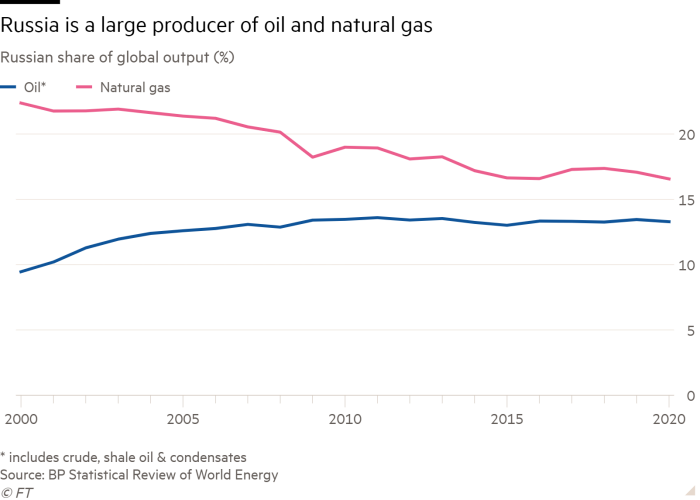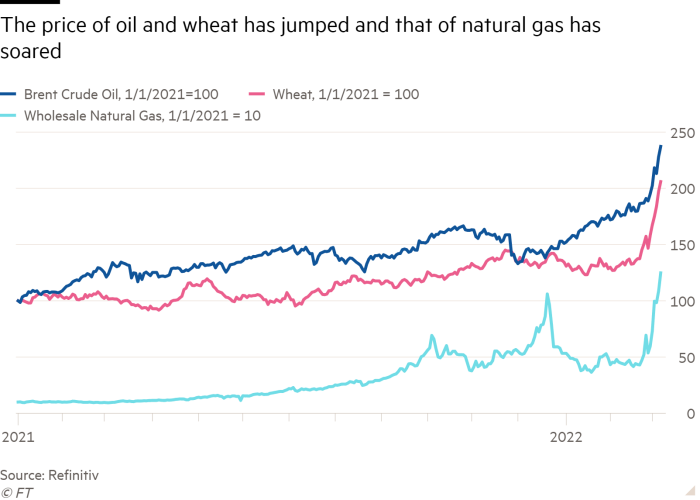Evil exists. He sits in the Kremlin, consumed by resentment and lust for power. He walks in a country whose crime was to dream of freedom and democracy. How to overcome such evil? Could economic sanctions, combined with the resistance of the Ukrainian people, force Vladimir Putin to back down? Or could they even lead to his overthrow? If not, could it risk an escalation to the use of nuclear weapons?
Undoubtedly, the sanctions used by the West are powerful. Putin even called them “similar to an act of war”. Russia has been largely excluded from the global financial system and more than half of its foreign exchange reserves have become useless. Western companies are afraid to continue to engage with Russia, for reasons of reputation and caution. Neil Shearing, chief economist at Capital Economics, predicts an 8% drop in gross domestic product, followed by a long period of stagnation. Jumping the central bank interest rate to 20% will in itself be costly. Shearing may be being too optimistic. (See graphics.)
Restrictions on energy exports are an obvious next step, as the Biden administration argues against German opposition. It is reprehensible to say the least that the high energy prices caused by Putin’s crimes are also funding them. Ukrainian economist Oleg Ustenko has made a strong case for such a boycott. Ricardo Hausmann of Harvard offers an interesting alternative: a 90% tax on Russian oil and gas exports. Since the elasticity of supply is low, he argued, the costs would fall on Russian producers, not Western consumers, and thus scarcity rents would also be transferred to the latter.
Regarding feasibility, Hausmann says that in 2019, 55% of Russian mineral fuel exports went to the EU, while another 13% went to Japan, South Korea, Singapore and Turkey. If all these countries agreed to tax its oil, Russia could try to sell it elsewhere, notably to China. But how much would China take, given the logistical challenges and the risk of Western retaliation of some kind?
A big question is how well the world could cope with the energy adjustment. An analysis by Bruegel concludes that “it should be possible to replace Russian gas as early as next winter without economic activity being devastated, people freezing or electricity supplies being interrupted”, although that would require a determined effort. With Hausmann’s import taxes, oil and gas prices in the rest of the world should even drop.

The purpose of sanctions, however, is to change politics and perhaps even the regime in Moscow. Is it doable? Experience shows that it is difficult to break an autocratic regime ready to impose enormous costs on its people: Venezuela is a recent failure. Against this, we can point to the fact that Putin did not mobilize the Russian people for a long war against Ukraine and the West. He even euphemistically called it a “special military operation” against “neo-Nazis”. These lies might start to unravel. Yet, as Sergei Guriev, a Russian-born economist who teaches at Sciences Po in Paris, noted in a dialogue with Princeton’s Markus Brunnermeier, Putin is moving from a dictatorship of spin to a dictatorship of fear. As long as those around him remain loyal, he may well retain power, no matter how bad his war and no matter how painful the sanctions.

Broad sanctions of this type are a double-edged sword, as they work by imposing significant costs on ordinary citizens. Among the big losers will be the budding middle classes. The regime might find it easy to convince the victims that their pain merely proves Western hostility. So, yes, some Russians could blame Putin. But, especially given Putin’s control of the media, many could blame the West instead.

The evidence for the effectiveness of sanctions is equally depressing. Dursun Peksen of the University of Memphis offers these conclusions: aim for major and immediate damage to the target economy; seek international cooperation; expect autocracies to be more resistant to sanctions than democracies; expect your allies to be more responsive than your enemies; and, finally, expecting sanctions to be less effective in achieving big goals than small ones. The West is in good shape on the first two points of this list, although restrictions on energy exports could be necessary for the first and cooperation with China for the second. But he is dealing with a hostile autocrat and is also trying to reverse a war he sees as a vital national and personal interest. The omens of success do not look good.

It’s also possible that successful support for the Ukrainian resistance, combined with sanctions that inflict huge costs on the Russians, without ending the regime, will push Putin to take even more desperate risks. This could even include resorting to the use of weapons of mass destruction against Ukrainian targets or other targets further west.

In retrospect, there probably should have been less ambiguity about Western support for Ukrainian independence. Now we must do all we can to support Ukraine’s struggle for survival, unless we take what seems the excessive and perhaps futile risk of a direct injection of NATO air forces into the war. . We should strengthen the sanctions, although they can ruin the Russian economy without changing its policy or its regime. We should declare that our war is not against the Russian people, although they may not forgive us for the pain we inflict on them. We should ask China and India to persuade Putin to end his war, although we must recognize that such an effort is very likely to fail.
Only bad choices exist. Yet Ukraine cannot be abandoned. We must continue.
Follow Martin Wolf with myFT and on Twitter


